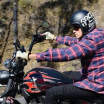The 57-year-old Brisbane car salesman has been selling Hyundais, Daihatsus, Daewoos and Toyotas most of his adult life, so it makes sense that he would be a fan of Japanese models. He now has three in various stages of restoration, including a rare 1969 Diahatsu Compagno Spider that is one of only three in Australia.
He bought his first car, a 1966 Honda S600 convertible, when he was 18 living in Essendon, Melbourne.
"It had four carbies and a twin cam motor," he enthuses. "It was like a racing engine. What a great little car. "When you put it in fourth gear at 60mph (96.5km/h) it was doing 6000 revs, at 70mph (112.5km/h) it was 7000 revs. So gauges were the same. I got it up to 10,500 revs once on the freeway which was, of course, the wrong thing to do. But it used to really scream along."
Wallis and his brother, Geoff, both owned S600 Hondas.
"We've always loved Japanese sports cars because they were made much better," he says. "Back then people were getting around in HR Holdens which were so agricultural by comparison. They had push-rod engines, not overhead cams like the Honda. For a little car they went pretty good and were far ahead of their time. The Japanese just copied and refined all the British cars of the time."
In 1974 Wallis moved to Queensland and sold his Honda to buy a Toyota Celica.
"I couldn't buy a new one because there was a six-month wait," he says. "They were $3800 new and I bought a 12-month-old one for $3300. I had it for five years, but then I needed a bigger car when our second child was born so I bought a Toyota Crown."
You can see a pattern developing. Fast forward past myriad Japanese cars to 2000 when Wallis was selling Daihatsus and Daewoos.
"I saw this Daihatsu Compagno Spider advertised for sale in the paper and asked the guys at work what it was," he says. "No one knew. Then I saw a brochure for a Charade and on the back cover was a pic of it. They were brought in by a Daihatsu dealer and there were only three in Australia; one in Tasmania, one in Victoria and here. I like it because it's unique."
Wallis admits that while he admires the technology of Japanese engines, it was the low-tech appeal of the Spider that got his attention.
"The trouble with Hondas was that because they were so hi-tech when they got to 75,000 miles (120,700km) you had to rebuild them," he says. "What I liked about the Daihatsu was that under bonnet it looked just like a Datsun 1200 motor. I like hi-tech, but I don't like the expense."
The Spider is powered by a one-litre, push-rod, four-cylinder engine with a single twin-throat carby and linked to a four-speed gearbox.
"It drives extremely well for its age," he says. "I've done all the mechanical work, had the leaf springs re-tempered, new shock absorbers, brakes, done all the body, etc. But it looks a little bit sad in the paint. The guy I bought it off painted it metallic blue. They didn't have metallics in the '60s. I want to get it painted in an original colour some time. I see people who do these projects who pull them apart and never put them together. I don't want to do that; I want to enjoy my car."
His Spider is on full rego and he drives it most Sundays. He has also recently bought a 1970 Honda 1300 coupe which has a four-carby air-cooled engine with a dry sump. He paid $2500 for it and in a few weeks plans to have it up and running. He's also bought another 1966 Honda S600 convertible just like his first car.
"That's my long-term retirement project when I'm 65," he says. He has joined the Classic Japanese Car Club formed in the past few months by likeminded Japanese car fans. "There are only 20 members, but our numbers are growing," he says. "If I'd joined the Daihatsu Compagno Spider club there would only be three of us in the club."




-2.jpg)


.jpg)

.jpg)
.jpg)























.jpg)
.jpg)

.jpg)





.jpg)
.jpg)

Comments